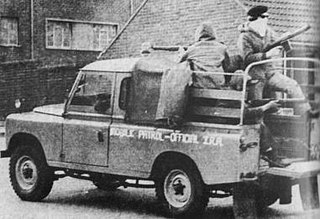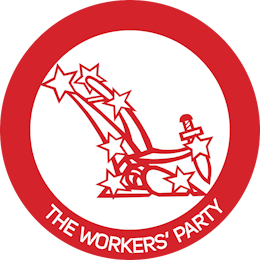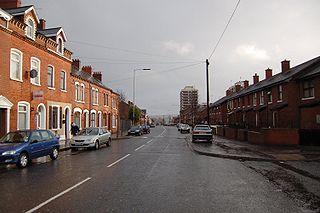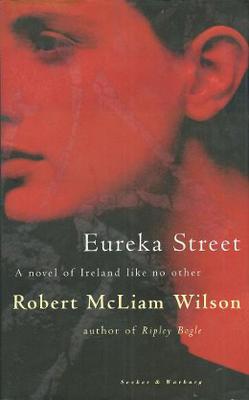
Belfast is the capital city and principal port of Northern Ireland, standing on the banks of the River Lagan and connected to the open sea through Belfast Lough and the North Channel. It is the second-largest city on the island of Ireland, with an estimated population of 348,005 in 2022, and a metropolitan area population of 671,559.

The Troubles were an ethno-nationalist conflict in Northern Ireland that lasted for about 30 years from the late 1960s to 1998. Also known internationally as the Northern Ireland conflict, it began in the late 1960s and is usually deemed to have ended with the Good Friday Agreement of 1998. Although the Troubles mostly took place in Northern Ireland, at times violence spilled over into parts of the Republic of Ireland, England, and mainland Europe.

The Official Irish Republican Army or Official IRA was an Irish republican paramilitary group whose goal was to remove Northern Ireland from the United Kingdom and create a "workers' republic" encompassing all of Ireland. It emerged in December 1969, shortly after the beginning of the Troubles, when the Irish Republican Army (IRA) split into two factions. The other was the Provisional IRA. Each continued to call itself simply "the IRA" and rejected the other's legitimacy.

The Ulster Defence Association (UDA) is an Ulster loyalist paramilitary group in Northern Ireland. It was formed in September 1971 as an umbrella group for various loyalist groups and undertook an armed campaign of almost 24 years as one of the participants of the Troubles. Its declared goal was to defend Ulster Protestant loyalist areas and to combat Irish republicanism, particularly the Provisional Irish Republican Army (IRA). In the 1970s, uniformed UDA members openly patrolled these areas armed with batons and held large marches and rallies. Within the UDA was a group tasked with launching paramilitary attacks that used the cover name Ulster Freedom Fighters (UFF) so that the UDA would not be outlawed. The British government proscribed the UFF as a terrorist group in November 1973, but the UDA itself was not proscribed until August 1992.

Stiff Little Fingers are a Northern Irish punk rock band from Belfast. They formed in 1977 at the height of the Troubles, which informed much of their songwriting. They started out as a schoolboy band called Highway Star, doing rock covers, until they discovered punk. They were the first punk band in Belfast to release a record – the "Suspect Device" single came out on their own independent label, Rigid Digits. Their album Inflammable Material, released in partnership with Rough Trade, became the first independent LP to enter the UK top 20.

The Workers' Party is an Irish republican, Marxist–Leninist communist party active in both the Republic of Ireland and Northern Ireland.

The New Lodge is an urban, working class Catholic community in Belfast, Northern Ireland, immediately to the north of the city centre. The landscape is dominated by several large tower blocks. The area has a number of murals, mostly sited along the New Lodge Road. The locality is demarcated by Duncairn Gardens, Antrim Road, Clifton Street, and dependent on opinion, York Street or North Queen Street. North Queen Street and Duncairn Gardens have often seen rioting between republicans and loyalists. The New Lodge is also an electoral ward of Belfast City Council.
Bernard MacLaverty is an Irish fiction writer and novelist. His novels include Cal and Grace Notes. He has written five books of short stories.

Ardoyne is a working class and mainly Catholic and Irish republican district in north Belfast, Northern Ireland. In 1920 the adjacent area of Marrowbone saw at multiple days of communal violence between Protestants and Catholics. Ardoyne gained notoriety due to the large number of incidents during The Troubles.

Robert McLiam Wilson is a Northern Irish novelist.
Nicholas Laird is a Northern Irish novelist and poet.

The Blame Game is a Northern Irish comedy panel series that has been broadcast on BBC Radio Ulster and later jointly on BBC One Northern Ireland. Starting in 2005, it is hosted by Tim McGarry. Regular panellists include comedians Colin Murphy, Neil Delamere, and, until 2020, Jake O'Kane. Former guest panellist local comedian Diona Doherty, became a regular panellist since series 19. As well as the regular three panellists, they also have a regular guest panellist. The guest panellist is usually a comedian from outside Northern Ireland who is not always as familiar with the complexities of Northern Irish politics which leads to some hilarity.

A series of riots in Dublin on 25 February 2006 was precipitated by a proposed march down O'Connell Street of a unionist demonstration. The disturbances began when members of the Garda Síochána attempted to disperse a group of counter-demonstrators blocking the route of the proposed march. The situation escalated as local youths joined forces with the counter-demonstrators.
Sam(uel) Thompson was a Northern Irish playwright best known for his controversial plays Over the Bridge, which exposes sectarianism, and Cemented with Love, which focuses on political corruption. His works fall into the social realist genre but are distinct in their dramatisation of Northern Irish issues; they were ground-breaking in documenting sectarian violence before the eruption of the Troubles.
Maurice Henry Leitch MBE was a Northern Irish author. Leitch's work included novels, short stories, dramas, screenplays and radio and television documentaries. His first novel was The Liberty Lad, published in 1965. His second novel, Poor Lazarus was awarded the Guardian Fiction Prize in 1969, and Silver's City won the Whitbread Prize in 1981.
Events during the year 1996 in Northern Ireland.
Bloody Sunday or Belfast's Bloody Sunday was a day of violence in Belfast, Northern Ireland on 10 July 1921, during the Irish War of Independence. The violence erupted one day before a truce began, which ended the war in most of Ireland. With the truce nearing, police launched a raid against republicans, but were ambushed by the Irish Republican Army (IRA) and an officer was killed. In retaliation, Protestant loyalists attacked Catholic enclaves in west Belfast, burning homes and businesses. This sparked rioting and gun battles between Protestants and Catholics, including paramilitaries. There were also gun battles between republicans/nationalists and the police, and some police patrols fired indiscriminately at Catholic civilians. Seventeen people were killed or fatally wounded on 10 July, and a further three were killed or fatally wounded before the truce began at noon on 11 July. At least 100 people were wounded. About 200 houses were destroyed or badly damaged, most of them Catholic homes, leaving 1,000 people homeless. See: The Troubles in Northern Ireland (1920–1922).

Literature of Northern Ireland includes literature written in Northern Ireland, and in that part of Ireland prior to 1922, as well as literature written by writers born in Northern Ireland who emigrated. It includes literature in English, Irish and Ulster Scots.

Eureka Street is a novel by Northern Irish author Robert McLiam Wilson, published in 1996 in the UK, it focuses on the lives of two Belfast friends, one Catholic and one Protestant, shortly before and after the IRA ceasefire in 1994. A BBC TV adaptation of Eureka Street was broadcast in 1999.
A series of riots in loyalist areas of Northern Ireland began in Waterside, Derry, on 30 March 2021. After four nights of rioting in Derry, disturbances spread to south Belfast on 2 April, where a loyalist protest developed into a riot involving iron bars, bricks, masonry and petrol bombs. Following this, civil unrest spread to Newtownabbey on 3 April, where cars were hijacked and burnt, and petrol bombs were also used against police. Carrickfergus in southern County Antrim also saw serious civil unrest on the night of 4 April and morning of 5 April, where loyalists created roadblocks to keep police out of local estates and threw petrol bombs at police vehicles.